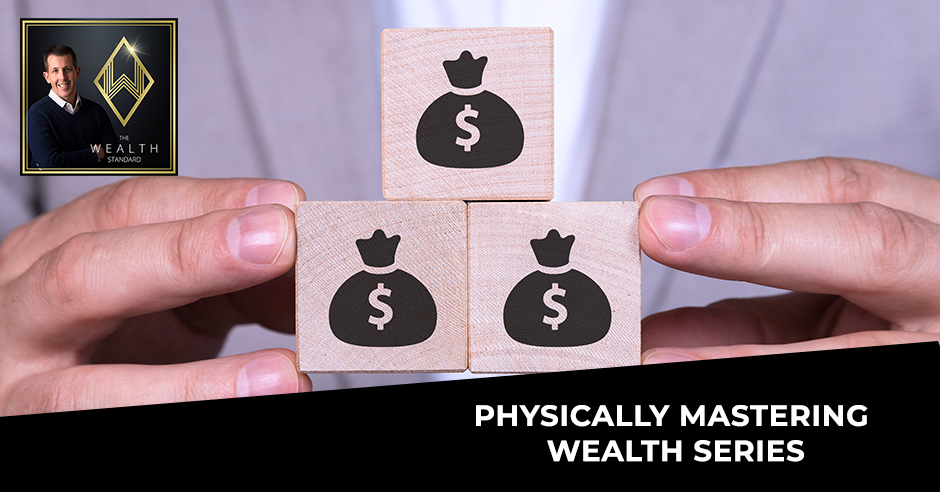Physically Mastering Wealth Series
Podcast: Play in new window | Download

Is it possible to physically master wealth? For the first part of the Physically Mastering Wealth Series, Patrick Donohoe discusses why understanding how habits are formed and how behavior is conditioned helps in creating more wealth. It’s all about figuring out what works best and leveraging your resources to produce optimal results. And then doing it again and again. Want to learn more? Tune in for more insight on how you can make creating wealth a habit!
—
Watch the episode here:
Listen to the podcast here:
Physically Mastering Wealth Series
Part 1
One of the driving forces of human beings is freedom, which infers financial freedom too. Several years ago, I set out to discover how any individual, regardless of their financial situation, could evaluate their finances in five minutes or less and have a firm date when they could achieve financial independence. The latest version of this calculator, which is free for readers, can be found at TheWealthStandard.com/calculator. The calculator is going to take you just a few minutes to complete, and it’s going to provide you with a specific financial independence date. Go check it out.
This episode is picking up on something I discussed last time, which is the idea of physical mastery. We show up to life doing pretty much the same thing day in and day out. It’s how we’re biologically wired. There’s so much going on in society now. Information, ideas, opinions, stimuli from every different angle. Look at our phones and how distracting with all the things that we can do. If you want to make progress when it comes to your wealth, you have to understand how habits are formed and how behavior is conditioned.
Without that, it’s going to be a challenge. Ultimately, that leads to taking excessive risks and risks always end in failure usually, especially if you’re taking consistent risks like that, and ultimately will lead to new condition behavior. Hopefully, if you’re learning those lessons, but taking proactive actions will allow you to start to pick up on other people’s failures and discoveries so that you don’t have to necessarily take too much risk and put failure on the line and obviously unintended consequences of that failure.
We’re going to get into 1 of the 2 primary ways in which Wealth Building occurs. I want you to consider this as a possibility for yourself. This is based on my experience. I’ve had the fortunate opportunity to meet lots of different people, experience a busy business, and see not just my own myriad of failures but also those of others in different businesses and industries, etc. These are the conclusions that I’ve come to. They’re not necessarily these absolute conclusions that will not evolve. Of course, they’re going to evolve, but I wanted to talk about the first, which is leadership and operational leverage.
It all boils down to leverage. I want you to consider the possibility that making more money, being wealthier as far as producing income is in proportion to the leverage of your time, number one, and then also relationships with other people. In other words, the idea that sentence is making a bigger impact with the time that you have. The biggest challenge is that 99.9% of us have been conditioned to do the opposite.
If you want to make progress when it comes to your wealth, you have to understand how habits are formed and how behavior is conditioned. Share on XLet me give you a story. This is a conversation I had with a younger guy, cool guy, good energy, lots of ambition, but he made a comment which points to what I’m trying to get across in this episode. He said first off, he managed a small supplement store of a bigger conglomerate. They were growing successful. He loved his job. He loved being healthy, working out and physical conditioning. He made a comment which he told me everything. We had a longer discussion and went into the details of it.
He said that he couldn’t leave his store for long to go to an event, be away for the weekend and take a day off. He can’t leave because the employees are or assistant managers will mess it up. They’ll screw it up. They won’t do it the way that he does it. In that, this is how most of us are conditioned because we’re raised in the US school system wishes, which is based in the Prussian system.
The Prussian system was designed to train factory workers as well as military soldiers. It’s for us to just follow orders or tasks. We’re not taught to necessarily be a leader. We’re taught to we’re a manager and tell people what to do. This is a huge example between the idea of management and leadership managers manage tasks and tell people what to do they usually use the tactic of fear to do it. That’s what society continues to condition in the political realm, in the school educational system, as well as in Corporate America.
That’s a big difference because that’s not leadership. Leadership initiated more training and conditioning then instead of disciplining somebody, it’s coaching them and continuing to train them until proven processes and principles gave become part of their makeup. It’s been conditioned into them where they would do what you would do. They would do what has been proven to be done. In this case, in this story, processes weren’t documented, training did not revolve around proven and successful processes or principles.
That’s why it led to this very awkward manager-employee relationship, which usually never progresses. This is where I want to highlight how valuable it is to understand the idea of leadership because if this manager of one store, he understands why his store was one of the most successful ones in the territory. He knew what it took to run a successful business.
Those processes, he held them close to the trust because there was so much meaning there. It was him. He was validated. He felt important because he was successful. The idea of leadership is not keeping that to yourself. The idea of leadership is training others to do exactly what you would do to get that success.

Physically Mastering Wealth: Consider the possibility that making more money, being wealthier as far as producing income is in proportion to the leverage of your time relationships with other people.
What does that have to do with leverage? If you have one store that’s successful, that’s being run by somebody doing things the way that you would do them, then two stores are possible, then 3, 4, and 5. Let’s say that a district is comprised of five stores. If you’ve done five stores, now you can do a district. If you can do one district, you can do 2, 3, 4, 5, or 10. Now you’re upwards of dozens of different shops that you as a leader are able to have stewardship over it because you have conditioned into employees, proven processes and proven systems.
This obviously supplement stores, but this applies to all industries. The technology industry has mastered this just because of how complex that world in that industry is. The more you understand leadership and how much you can leverage time by employing proven tactics, proven strategies, now you can control a host of resources and subsequently make a lot more money.
I’m going to keep going with this idea of operational leverage because our world is evolving rapidly and people are looking for ways in which they can be more efficient all the time. You don’t have to go out and necessarily invent it. I looked at really two things in the business world that create an immense amount of leverage. The first is the media. The second is technology. It’s the same idea as you’re looking for ways in which you can do more with the time that you have.
Let’s use an example of a story. We’re doing a live event. Zoom-wise, there are a couple of people that are doing the event. It’s basically training that I do a couple of times a year for other financial advisors. I have done this with a partner of mine for years. First off, the business that I run is very different than the typical financial services, financial planning practice because we’ve done it for many years virtually through webinars. This was before webinars even popularized. Before video webinars, we used to go to a meeting.
Adobe Connect is another one that we used way back in the day. It’s super clunky software, but we didn’t have people come into our office, but the typical financial practice is that they went to people’s houses. They had people come into their office. It’s inefficient in my perspective. We were always told, “You can’t do that.”
People will never do that. They’ll never do business with you unless you build that face-to-face relationship. Even early on, we had compliance departments flying out to our office gate because they were like, “No way you can’t build a relationship with somebody. You can’t do business with people without seeing them face to face.” It was a very challenging time.
Obviously, it’s been adopted by a lot of different businesses these days, but my point is it’s very difficult to go from what you’ve been doing to something that’s new. This is why conditioning is so important. Physical mastery requires repetition, but even during COVID, because with this advisor group, I had been talking to them for years about virtual business and meeting with clients over webinars, the technology was easier. Conditioned behavior is like, “No. I can’t do that.”
COVID forced it. This is usually how behavior changes. Either it’s a conditioned change, very strategic we condition change or there’s a massive disruption that forces change. If you think you need to change something, it’s going to continue to compound, grow and fester until you’re forced to change. Might as well rip the Band-Aid off right now.
There’s two things in the business world that create an immense amount of leverage. The first is the media. The second is technology. Share on XCOVID comes on and people start to see, “I can do Zoom webinars. I can do this and that,” before they had to conduct a conditioned behavior to do things a certain way because that’s where they found success. Obviously, it makes sense, but at the same time, this is the idea behind Zoom being hugely beneficial because now you can have 5 meetings a day instead of 2. You can meet with dozens of more people who don’t necessarily have to come to your office in coordinating schedules, getting time off, getting a babysitter and the list goes on.
The idea of just having technology of being able to communicate with somebody face to face across the internet, massive leverage is possible because of that and lots of businesses experience it. That’s just an example because there are technologies everywhere. They are essentially finding ways to replace predictable things that you are currently doing manually. I’m not saying that you replace people as a whole. There are theories around AI and robotics doing that.
I don’t want to go that far. What I’m saying is that there are inefficiencies in how you manage your time. The most valuable time that anybody has is spent in front of other people, like engaging in meaningful conversation, but there’s lots of other stuff that takes away from that, whether it’s paperwork, documentation, appointment reminders, how you do the actual meetings or taking notes.
I can keep going on with examples, but there are technologies that are coming out that allow you to spend more time in the most meaningful things, begin to look for it, and incorporate it into your system and your rhythm. Technology is the first thing. Media is the second thing, whether it’s video or podcasts. When you do a video, you do it once you spend an hour doing it, “I’m going to do this podcast for 15 or 20 minutes.” It can be listened to by one million people, but I only spent 15 to 20 minutes on it. That is leverage.
I have another story. I have a good buddy who is successful in a specific construction niche because he was able to find a foundation raising. When a foundation settles and cracks, he found a very efficient process that was developed in the Midwest that he went out and learned and then brought to Utah. Now he has locations in Northern and Southern Utah where he has these systems that he’s used to raising the foundation and do it inexpensively as well as efficiently quick.
It’s what he’s done to train his staff. He started to use media. He’ll record how this machine is operated, how you do a phone call, how you go out and do a bid. He found all the different successful ways in which he did it, and then he’d created media that trained staff in order to do it. That’s another form of media being an ideal way to leverage the most predictable things because he found that time and energy were being spent in training. Leaves doing it manually every single time. There were certain things in training that were predictable that he had to do over and over again.
He started to use media as leverage so that he could spend his time doing more meaningful things. There are lots to unpack here. I’m not going to do it in this show because there are so many different examples, but building physical mastery around the idea of leadership is for you to constantly be finding ways in which you can be more valuable with the time that you have.
It creates massive wealth for people you look at, whether it’s district managers or executive-level positions. They understand operations and leadership of people, so that with the time that you have, you’re able to have stewardship over lots of different production because you understand the dynamics of leadership people, relationships as well as proven and successful processes.

Physically Mastering Wealth: Building physical mastery around the idea of leadership is for you to constantly be finding ways in which you can be more valuable with the time that you have.
I’m going to give you some books. You guys can go check out the show notes on TheWealthStandard.com for some of the best books that are out there. I mentioned a lot of this stuff in my book, which is Heads I Win Tails You Lose and get a free copy by just going to the website under the resources tab. There’s a couple of other Cameron Herold. I’ve known Cameron for several years. He has several books on this. One of the first ones was Double Double, but he has other ones called Meetings Suck. He has a Vivid Vision. He’s a great author. It’s very easy to read books and understand. They have actionable things that you can do.
Another one, a couple of books by Jocko Willink, Dichotomy of Leadership. It is an awesome book. He also has Leadership Strategy and Tactics, which is a field manual that gives you playbooks of how to find opportunities to better lead your team instead of just managing them. There’s Traction by Gino Wickman. This is a way in which you can incorporate processes into your business and find successful processes and have your team replicate those processes.
The CEO within another great book that I’ve come across, and then most of the stuff by John Maxwell is absolutely incredible. That’s part two, which is production leverage. You are producing wealth which I believe is the one you have the greatest return and there are infinite possibilities, but you have to understand the ideas of leverage.
Find ways in which you ingrain that in your mind because your body and mindset is pretty much influenced to do the exact opposite because that’s how we have been raised in this United States society, under this hierarchical management-driven, fear-driven, whiplash-driven society, and that’s not the way to lead. That’s not how you create leverage. Next episode, we’re going to talk about financial habits, some of the few things you can do to institute financial habits that will create wealth. Thanks for reading. We’ll see you back next episode. Bye.
Important Links:
- TheWealthStandard.com/calculator
- Heads I Win Tails You Lose
- Double Double
- Meetings Suck
- Vivid Vision
- Dichotomy of Leadership
- Leadership Strategy and Tactics
- Traction
Love the show? Subscribe, rate, review, and share!
















